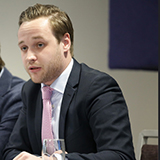Medical students have similar asks to their senior colleagues: to have adequate time and resources to look after patients in the way they deserve
 It was widely reported last week that some medical schools have asked their senior clinical students to help out in areas of acute hospitals facing severe pressures. These pressures have resulted from political inaction, which has left the service ill equipped to cope with spiking demand over the first few weeks of January.
It was widely reported last week that some medical schools have asked their senior clinical students to help out in areas of acute hospitals facing severe pressures. These pressures have resulted from political inaction, which has left the service ill equipped to cope with spiking demand over the first few weeks of January.
It paints a woeful picture of the NHS and indicates that, despite repeated claims from the government that spending is going up and the workforce is expanding, the health service is struggling more than ever before. The fact that in 2018 the struggle is having a direct impact on patient care should make everybody stop in their tracks to find an alternative solution.
Medical students are placed in the clinical environment to learn medicine and its application. They spend time with the medical team, speaking to patients, practising examination techniques, and undertaking clinical skills where safe. This apprenticeship-style training is very important and when done well provides pleasant memories of time well spent learning to be a doctor.
It is therefore unsurprising that some have been puzzled by opposition towards the reported requests being made of medical students to help out as long as they act within their competencies. Acting within your competency is vital for any healthcare professional—from students to senior consultants with years of experience. It is also the individual’s responsibility to ensure that they don’t overstep that mark. We know that we have highly intelligent, successful, and caring medical students in UK medical schools who will be a useful and reliable pair of hands, working as part of the team to provide patient care. Indeed, some medical students have responded positively to apparent requests for them to “go in.”
The requests we have seen have also been cautious. They have noted the extraordinary nature of the ask and have emphasised the need to be safe. Therefore, I don’t think we should be in any position to criticise the universities making them.
What we should be focusing on is the fact that it’s awful it has come to this. The NHS is resorting to desperate measures and I don’t blame them. I don’t blame them because this desperation emanates from a desire to make sure patients are safe. However, it is still right to highlight where this plan falls down.
A student in an overstretched environment where more senior clinicians are focused, rightly, on providing the service that patients are having to wait for is not appropriate. In any other situation where hospitals were deemed unsafe, were working at levels of patient occupancy that left very little residual capacity, and were so chronically overstretched with assessing incoming patients that it wasn’t possible for them to train junior doctors, those training places would be removed.
On this important principle alone, it cannot be justified that in cases that would ordinarily warrant junior doctor removal, we can be happy with the prospect of sending in much more junior members of the team who have yet to acquire a primary medical qualification. It is this contradiction that highlights the material difference between these requests and routine medical student placements on the wards, in the acute or critical setting, and even in the emergency department.
It has been a tough winter and it is in the blood of all medical students to want to help where they can. They also have very similar asks to their junior and senior doctor colleagues: to have adequate time and resources to look after patients in the way they deserve. And to work in a system offering hope, dignity, and most importantly safety. Are these basic demands—for the sake of doctors and their patients— really too much to expect?
Harrison Carter has co-chaired the British Medical Association’s UK medical student committee since 2013. He is a final year medical student at Bristol University where he also completed his Bachelor’s degree in cancer biology and immunology. He was a Newton Masters Scholar at Downing College, Cambridge, where he completed a Masters in public health and a Lister student at Oxford University.
Competing interests: None declared.
